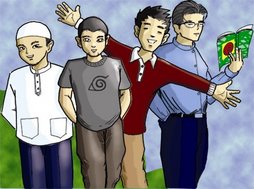Air is the ocean we breathe. Air supplies us with oxygen which is essential for our bodies to live. Air is 99.9% nitrogen, oxygen, water vapor and inert gases. Human activities can release substances into the air, some of which can cause problems for humans, plants, and animals.
 There are several main types of pollution and well-known effects of pollution which are commonly discussed. These include smog, acid rain, the greenhouse effect, and "holes" in the ozone layer. Each of these problems has serious implications for our health and well-being as well as for the whole environment.
There are several main types of pollution and well-known effects of pollution which are commonly discussed. These include smog, acid rain, the greenhouse effect, and "holes" in the ozone layer. Each of these problems has serious implications for our health and well-being as well as for the whole environment.
One type of air pollution is the release of particles into the air from burning fuel for energy. Diesel smoke is a good example of this particulate matter . The particles are very small pieces of matter measuring about 2.5 microns or about .0001 inches. This type of pollution is sometimes referred to as "black carbon" pollution. The exhaust from burning fuels in automobiles, homes, and industries is a major source of pollution in the air. Some authorities believe that even the burning of wood and charcoal in fireplaces and barbeques can release significant quanitites of soot into the air.
Another type of pollution is the release of noxious gases, such as sulfur dioxide, carbon monoxide, nitrogen oxides, and chemical vapors. These can take part in further chemical reactions once they are in the atmosphere, forming smog and acid rain.
Pollution also needs to be considered inside our homes, offices, and schools. Some of these pollutants can be created by indoor activities such as smoking and cooking. In the United States, we spend about 80-90% of our time inside buildings, and so our exposure to harmful indoor pollutants can be serious. It is therefore important to consider both indoor and outdoor air pollution.






Tiada ulasan:
Catat Ulasan